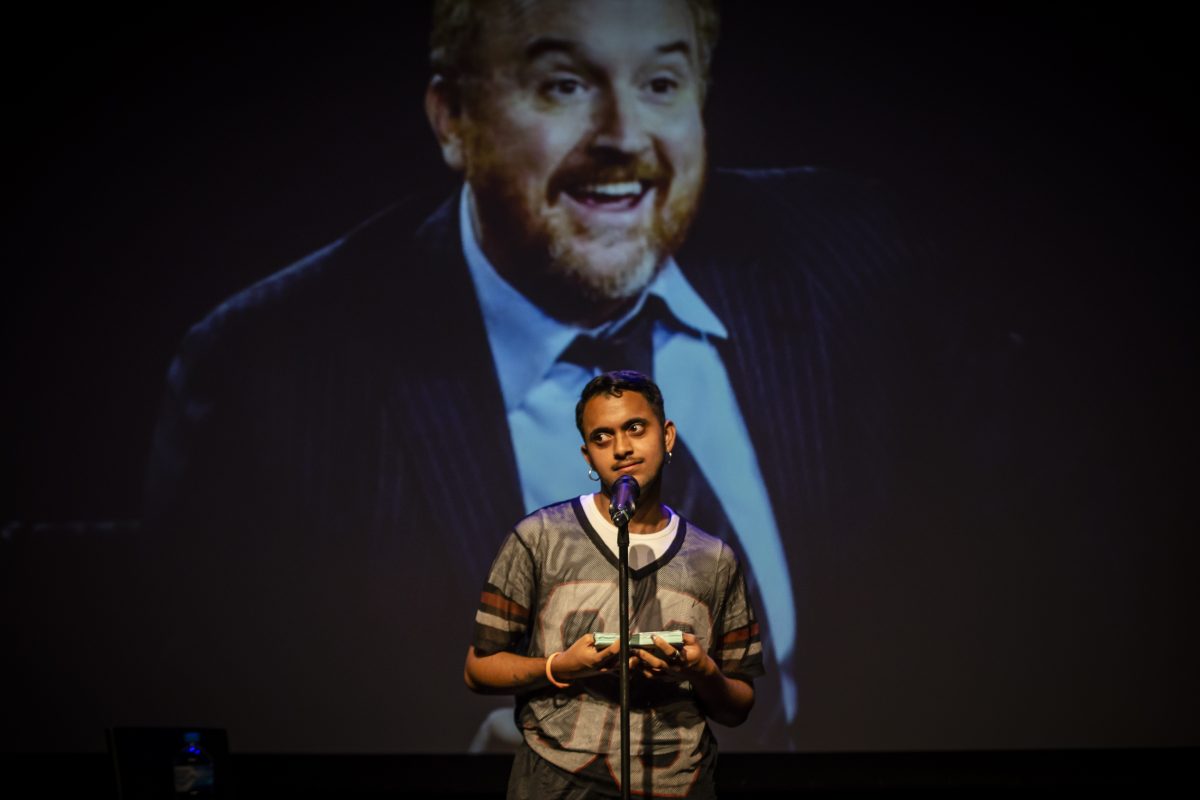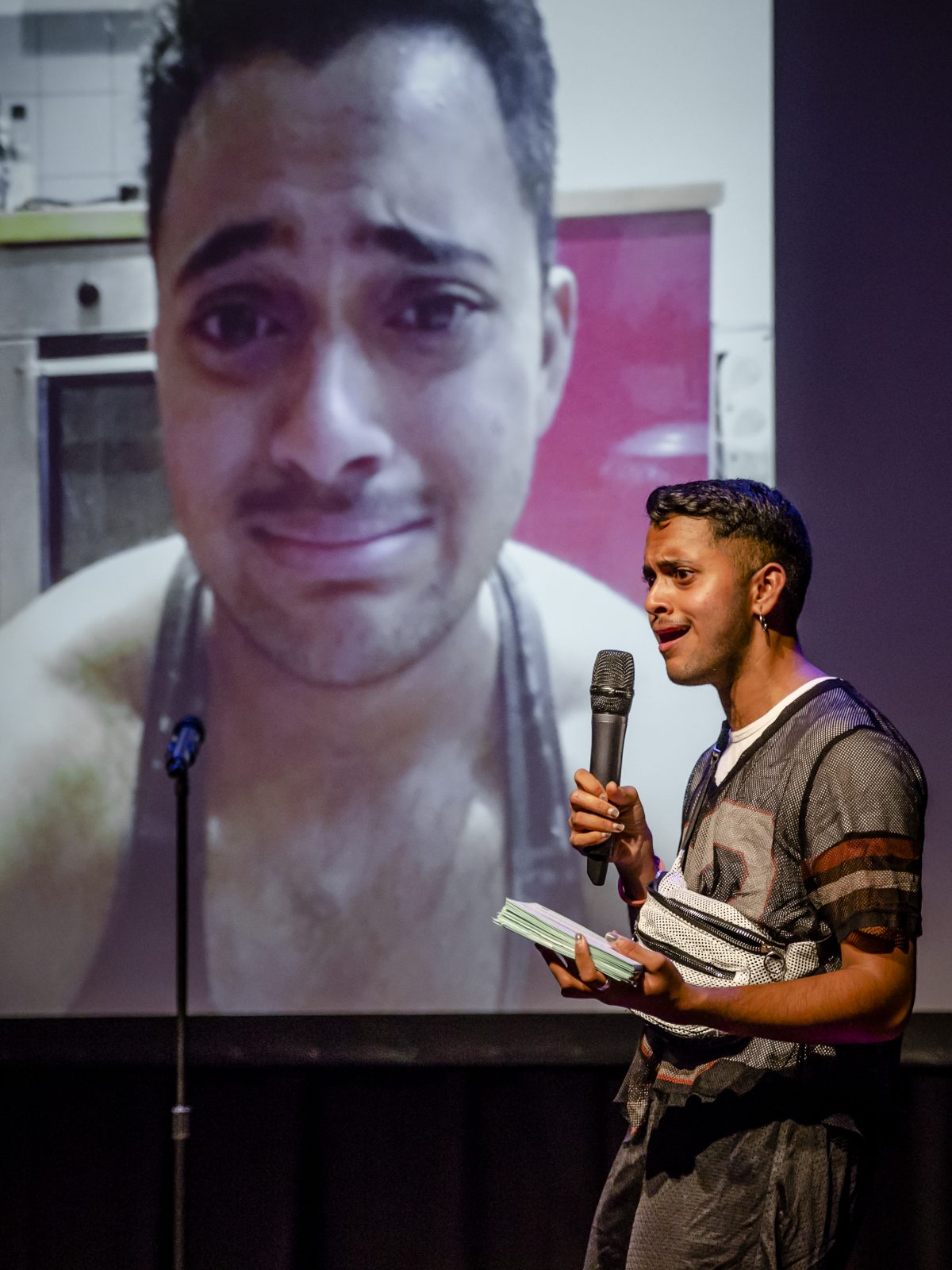Krishna Istha: The irony of institutionalised Pride

Krishna Istha, one of Artsadmin’s Bursary artists, reflects on Pride.
It’s Pride month, but pride has never felt more urgent and more irrelevant simultaneously, than right now. I’m a trans performance maker who has been working in theatreland for the last 7 years, I’ve also been out as trans for those 7 years. My claim to fame is that 6 years ago, I can be accredited to pushing for gender-neutral toilets at the Arcola Theatre at a time when no theatres had them and when it wasn’t fashionable yet (thanks Nic Connaughton for listening to an angry baby trans and for making it happen). Needless to say, I’ve been walking the walk for a few long years without even realising it. Also needless to say, I’m f*cking tired. There are a lot of trans artists, especially Black and brown trans artists way before me, who have done the work for us to be where we are today. How are they today? Also tired.
So when I see theatres and museums scramble to find trans artists of colour for their line ups, I am reminded, nothing we ever do will see us as credible artists outside of ‘Pride Month’. I am reminded that I’ve spent years working on other artists’ works (meaning cis artists and white artists), often being employed for my queer/trans/POC perspective. My trans body adds a layer of mystique and risk to their shows, that further their reputation as “radical” and “groundbreaking”. Like most other full-time artists with no rich daddy and a trust fund, I will do anything if it pays. I also do really enjoy collaborating with others, so I say yes. I also have to say that this isn’t my experience with everyone. Some of them have become mentors, have listened, have propelled my career forward and I have learnt a tremendous amount from working on other artists’ works over the years.
But in the same spaces where their shows have been applauded for being out-of-the-box, my own shows are never programmed because they are deemed “too radical” or too “unrelatable”. This is true not just for me, but for many trans artists, Black artists and artists of colour. When I do get an opportunity, I am not given the same space to be weird, experimental or genre-pushing like my cis/white counterparts are allowed, even when they use my experiences and expertise to position their work in a contemporary landscape. So what I’m hearing is – white cis people can write trans characters (or write me) into their shows but I am not allowed to have my own voice on my own terms.
In the backdrop of the current political climate, with Covid-19 revealing the inequalities between artists and institutions, with the Black Lives Matter movement highlighting that Black artists, writers, curators etc. are paid less than their white counterparts, with the UK’s political climate rife with transphobia and the government trying to strip away trans rights, and of course the conversations around the-one-who-must-not-be-named… we see major theatres, arts institutions and brands using this month as a marketing strategy, like as if a post let’s them off the hook. For some of us, we’ve seen lip service our entire lives. We knew Karen before Karen was even born. White people in the industry are creating task forces and Zoom groups to discuss the ‘future of live performance’, fully acknowledging the disparities and recognising the need to empower marginalised creatives within the arts. But Black folks, queer and trans creatives, lower income artists, disabled artists etc. cannot be at these discussions because they’re busy surviving this moment. They don’t have time for Zoom chats when they’re fighting for their mere existence!
The same industry talking about discrimination, pay disparity, and of course the lack of governmental support during Covid-19 which will likely decimate our arts industry, alarmingly elect, hire and invite right-wing bigots to be on their boards, or to the highest paid jobs in the arts while artists continue to live precarious lives. Munira Mirza (a political advisor who is now leading a commission to examine racial inequality, who I feel the need to appologise for because technically she’s one of my people, but no she will never be one of my people) thinks racism is a myth and that multiculturalism is stupid (paraphrasing here), but she also (according to the internet), was a member of Arts Council England, and is on the board of the Institute of Contemporary Arts (ICA). Doug Gurr, the current Amazon UK boss, whose only experience with museums is that he was appointed by Boris Johnson to be a Trustee of the National Gallery in 2019, has just been hired as the new head of the Natural History Museum, while Black and brown folks with years of curatorial and business experience in the museum sector are told they are constantly “emerging”. He’s also a non-executive board member of the Tory government?!?! In 2017, Elizabeth Murdoch (Rupert Murdoch’s daughter) was appointed to the Arts Council England’s National Council and, of course, people like the Sackler Family continue to fund the arts in the UK. Having their names associated with the arts gives them a free pass, a cheap marketing tool to look cultured and not evil (for lack of another word). They remain the same people who elect into power those who champion cuts to arts funding, who don’t tax the rich, while they get richer, the poor get poorer, which invariably affects Black and/or people of colour, trans people, disabled folks and other marginalised lives. So how can we expect to have artists from these backgrounds ever thrive, let alone survive in the arts industry as it stands?
They’re the same reason why me and artists like me can’t make the work we want to make and be funded for it because, at the end of the day, the institutions are in debt to these people who could cut all of their funding and evaporate their hard work at a moment’s notice.
This Pride, I’m angry. This Pride, I want better nuanced discussion around inclusion in the arts. This Pride, I want producers, programmers, board members, funders in the arts, people with power to stop and listen. Stop making excuses. Stop with the lip service. Stop fearing being cancelled and instead take proper action. Hire my people (not Munira Mirza)! It’s not just Pride that was a protest, for some, everyday is a protest.

